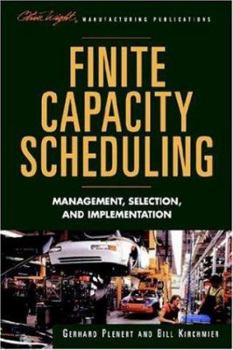Finite Capacity Scheduling: Management, Selection, and Implementation (Oliver Wight Manufacturing)
"Even the best companies tend to be reactive because of poor scheduling. Often their employees prefer being reactive because they are so used to operating in this mode. The shoot-from-the-hip approach is very common in American culture. The West was won with a 'six-shooter'and many shop floor managers continue to function in the shoot-from-the-hip mode. While there are some conditions that might benefit from the shoot-from-the-hip philosophy, modern competitive manufacturing is not one of them." --from Finite Capacity Scheduling In this groundbreaking book, internationally recognized experts explain why obsolete scheduling methodologies may be preventing your company from achieving competitive levels of productivity, and how today's powerful new finite capacity scheduling (FCS) technologies can transform it into a world-class competitor. The first comprehensive guide to understanding, choosing, implementing, and managing FCS technologies, Finite Capacity Scheduling: Exposes the problems inherent to infinite capacity scheduling models Explains why FCS is the key to modern competitive manufacturing Shows how FCS maximizes resource use and cuts inventory costs Proves that FCS is a natural complement to MRP, ERP, TQM, and JIT Reviews current and emerging FCS technologies Offers guidelines for choosing the best FCS system for your company Describes how to integrate FCS seamlessly into your management structure
Format:Hardcover
Language:English
ISBN:0471352640
ISBN13:9780471352648
Release Date:January 2000
Publisher:Wiley
Length:251 Pages
Weight:1.20 lbs.
Dimensions:1.3" x 6.6" x 9.4"














